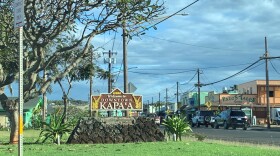-
House Bill 99 is meant to equip high school students with education "necessary to ensure that the next generation are climate leaders."
-
Researchers just reported that the most abundant species of invasive algae in the main Hawaiian Islands has been found in Papahānaumokuākea at Kuaihelani, or Midway Atoll.
-
At least seven people were hurt with suspected fireworks injuries in five separate incidents on Oʻahu this New Year's Eve.
-
Consumers' declining confidence in the economy might dampen tourism, Kauaʻi's largest industry.
-
Ed Freeman and his wife, Susan Bauer, spoke to The Conversation's Catherine Cruz about bringing a replica of the Vietnam Memorial Wall, "The Wall that Heals," to Oʻahu in January 2026.
-
Therapist Ami Kunimura of the Self-Care Institute spoke with HPR’s Maddie Bender about her upcoming workshops in the new year.
-
The cast and crew of "The Return of Kapaemahu" spoke to The Conversation's Catherine Cruz as the free hula show at the Kūhio Beach Hula Mound in Waikīkī comes to a close.
-
It’s rare to hear any fireworks in the Āliamanu neighborhood after the devastating New Year’s explosion that killed six people, including a 3-year-old, and injured more than two dozen others at 4144 Keaka Drive. But as the one-year mark approaches, some neighbors are on edge as the community is still healing from the tragedy.
-
To call this year's reporting thought-provoking is too simple. So let's just let the Hawaiʻi Public Radio reporters and producers speak for themselves.
-
The Hawaiian Humane Society is reminding residents that pets are sensitive to loud noises and bright flashes. It released a list of precautions on keeping pets safe to minimize how many run away from home or get hurt.
-
Aaron Salā, the cultural creative producer for Cirque du Soleil’s ʻAuana, spoke to HPR’s DW Gibson about the show as it reaches its first anniversary.
-
Dan Dinell, the son of the University of Hawaiʻi urban planning professor Tom Dinell, spoke with The Conversation's Catherine Cruz about his father's passing earlier this month.















